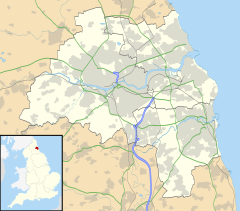Whickham
| Whickham | |
|---|---|
| Whickham shown within Tyne and Wear | |
| Population | 16,652 (2011) |
| OS grid reference | NZ205605 |
| Metropolitan borough | |
| Metropolitan county | |
| Region | |
| Country | England |
| Sovereign state | United Kingdom |
| Post town | NEWCASTLE UPON TYNE |
| Postcode district | NE16 |
| Dialling code | 0191 |
| Police | Northumbria |
| Fire | Tyne and Wear |
| Ambulance | North East |
| EU Parliament | North East England |
| UK Parliament | |
Whickham is a town in North East England, 5 miles (8.0 km) south west of Newcastle upon Tyne, and is situated on high ground overlooking the River Tyne. In 2011, it had a population of 16,652, and it has a postal address of Whickham, Newcastle upon Tyne, NE16. Whickham is a semi-rural, middle class suburban town and former civil parish. Built on a large hill, it overlooks a large part of the northern and western horizon, including the MetroCentre, and contains a mixture of large suburban housing estates and private streets for the local residents. The main street that goes through the town contains some shops and retailers, a few pubs and restaurants, and St. Mary's Church, the oldest building in Whickham.
Whickham underwent some expansion in the 1950s when the Lakes Estate was built just off Whickham Highway. Then later in the decade the Oakfield Estate just off Whaggs Lane was built. However, house building in the early 1960s transformed the then village into a small town. Grange Lane Estate began the seemingly unending development by J. T. Bell, (Bellway), the builder, who went on into Clavering Park, Clavering Grange, the Cedars and then Fellside Park. Even after this expansion, there is some debate that the old spirit of the village was finally lost when the main street of Whickham was redeveloped.
To the south-west of Whickham, above the River Derwent, are the ruins of Old Hollinside, a fortified manor house once owned by the Bowes-Lyon family.
Whickham has been a national finalist in the RHS 'Britain In Bloom' competition over fifteen times, and, as of 2012, has twice been awarded 'Outright National Winner' in its category.
Whickham has an extensive and old history, and some influential people have been connected to the area. The 19th century inventor and industrialist Lord W.G. Armstrong was privately schooled in the village, and Oliver Cromwell stayed in Whickham for a few days in 1648, during his march to Edinburgh. Local rumour has it that whilst in Whickham, Cromwell stayed in Dockendale Hall, one of the oldest buildings in the village, for two days. The area is now home to some of the region's media personalities, as well as business and political leaders.
...
Wikipedia

